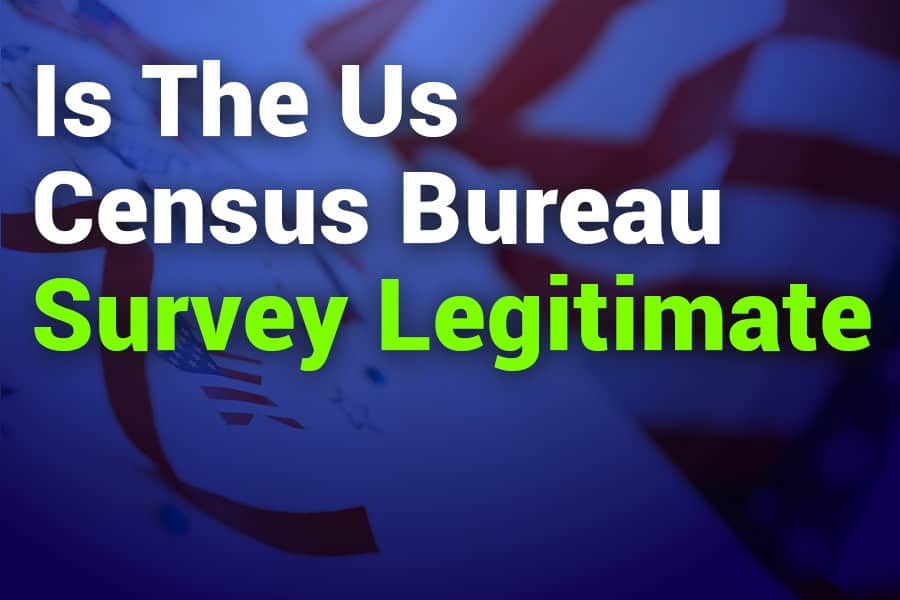The US Census Bureau conducts surveys to shape public policies, determine funding allocation, and provide essential data for various studies. But is the US Census Bureau survey legitimate? As many people are concerned about fraud and scams, it’s vital to understand how these surveys work, why they’re necessary, and how to verify their authenticity. This article delves into the legitimacy of the US Census Bureau surveys, addressing frequently asked questions and offering tips to avoid falling prey to potential fraud.
Is the US Census Bureau Survey Legitimate?
The US Census Bureau survey is indeed legitimate. As part of the federal government, the Bureau gathers vital information about the US population for policy-making and resource distribution. Always check for official credentials when approached for a survey to ensure authenticity.
The US Census Bureau Survey
The US Census Bureau is an official federal entity collecting data about the US population and economy. The Bureau’s surveys, like the decennial census, American Community Survey (ACS), and others, are designed to gather statistical information that guides public policies and economic planning. But how do we know if these surveys are legitimate? The legitimacy of the US Census Bureau surveys comes from their legal backing and the critical role they play in national planning. For example, the decennial census, conducted every 10 years, is constitutionally mandated.
The Census Bureau follows a strict protocol for conducting its surveys. They use identifiable staff, official badges, and distinct documentation to conduct interviews. Moreover, the Bureau’s surveys are done with the primary aim of improving public services, not soliciting personal information like Social Security numbers, bank account details, or credit card information. Therefore, if someone claiming to be from the Census Bureau requests sensitive data, it’s likely a scam.
Another aspect of the Bureau’s legitimacy is its transparency. The Bureau often publicizes its surveys, informing citizens about the survey process, its purpose, and how the collected data will be used. Before any major survey, like the ACS, the Bureau sends out official notifications to ensure that households know about the upcoming survey. Respondents are encouraged to verify survey legitimacy through the Bureau’s official website or helpline.
It is important to recognize that the data collected is necessary for policy-making and helps distribute federal funds to local communities. These funds support essential services like education, healthcare, and infrastructure. In this sense, the US Census Bureau survey’s legitimacy is legal and functional.
How to Identify a Legitimate US Census Bureau Survey?
Survey Identification Process
When approached by someone claiming to be from the US Census Bureau, verify their credentials. Bureau staff will carry a government ID badge with their photograph, a Department of Commerce watermark, and an expiration date.
Communication Methods
The Bureau primarily contacts respondents via official mail or in-person visits. If contacted through any other method, like a phone call or email, verify by calling the official Census Bureau number.
Common Scams and Red Flags
If a surveyor asks for sensitive information, such as your Social Security number, bank account details, or passwords, it’s a red flag. Legitimate Bureau surveys never request such data.
Online Verification
Use the Bureau’s official website to verify whether a survey is ongoing. Enter the survey name, the interviewer’s name, or any other provided credentials to check their authenticity.
Signs of a Legitimate US Census Bureau Survey
- Official Badges: US Census Bureau representatives wear official badges with a photo, Commerce watermark, and ID number.
- Clear Purpose: The survey’s purpose will be clearly explained, such as collecting data for policy-making or funding distribution.
- No Personal Financial Requests: Legitimate surveys will not ask for Social Security numbers, banking details, or credit card numbers.
- Public Announcements: Before conducting large-scale surveys, the Bureau usually sends advance letters to inform citizens about what to expect.
- Return Address: Surveys will have a return address linked to an official Census Bureau office, ensuring authenticity.
Why Participate in US Census Bureau Surveys?
Participation in the US Census Bureau surveys is not just about compliance; it’s a civic duty that has significant societal implications. The collected data informs government decisions that impact the allocation of public services like schools, healthcare, and public transportation. It also aids in business decisions, such as identifying potential areas for market expansion.
Responding to these surveys helps to ensure accurate representation and fair distribution of resources. By participating, citizens contribute to a better understanding of the nation’s demographic, economic, and social needs, helping policymakers to make informed decisions. In addition, the data helps researchers, NGOs, and other organizations develop effective programs and strategies that benefit society as a whole.
When citizens do not respond to the surveys, it can lead to inaccurate data, misallocating resources, and underrepresentation in Congress. Therefore, understanding the importance of these surveys is vital not only for individuals but also for communities.
Bottom Line
The US Census Bureau survey is undoubtedly legitimate and essential. It helps shape national policies, allocate resources, and provide a clearer picture of the nation’s demographic and economic landscape. Ensuring the accuracy and credibility of the survey process is both the responsibility of the Census Bureau and the respondents. Verifying the authenticity of the survey through official channels ensures public trust and participation, making the survey process more effective.


